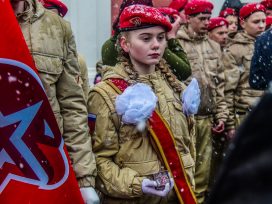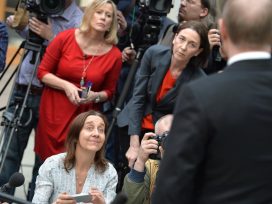Ever since the beginning of the crisis between Russia and Ukraine in 2013 there has been much discussion about the power of Russian propaganda in the West, and particularly within the EU. Russia has been able to attract a wide range of sympathizers across the political spectrum. But the way in which Russia exploits these other voices is different from how it operates at home. For more than a decade now, domestic Russian politics has been dominated by actors, proxies, cynics and fakes. If the Kremlin needs sympathizers, it invents or pays them. In the EU the forces exist anyway; the Kremlin has not created them, but has proved adept at “nudging”, that is slightly pushing them in the required direction.

Reflections of the Kremlin in an icy Moskva River. Photo: kostin77. Source: Shutterstock
At least that is how things work at stage one. The role of direct contact and covert finance in influencing such organizations has been under-investigated. There are some signs of the Kremlin creating fakes and proxies in the EU too, which would multiply the problem many-fold. But for now at least the focus should be on the Kremlin’s indirect role and its ultra-flexibility in exploiting any group.
Political technology at home
Vladimir Putin’s Russia was designed as a system of monopoly control. Before 2011 it was even run by one man, Vladislav Surkov, who acted in the words of the Eurasianist ideologue Aleksandr Dugin “not just as a puppet master but as a demiurge”. The Kremlin’s techniques were direct. Parties were created, co-opted or controlled, but they all took orders. Several commentators have exploited the metaphor of Surkov’s desk, with its numerous named phones for direct contact with the parties and NGOs he controlled.
The Kremlin cannot do this abroad; with the exception of one thing that it carries over – eclecticism. Despite now posing as a conservative power, the Kremlin no longer has a single ideology to promote. In fact it has no ideology. But it is used to playing all sides. In Russia, the Kremlin sought to direct all the pieces on the political chess board; both sides – black and white. And, to undermine the metaphor of how chess is actually played, it also policed the edge of the board and determined who could actually play. Thus, when it comes to influence-peddling abroad there is no contradiction and indeed there is a certain logic in the Kremlin seeking to influence both left and right, nationalists and separatists, traditionalists and post-modernists, as all Moscow is trying to do is align them to a realpolitik that does not even serve Russian national interest, but only regime prosperity and survival.
This tendency is only enhanced by the multiplication of channels of influence abroad. “The Kremlin” is a single actor at home, though there are many satellite influence groups. Abroad there are various networks courted by people such as Dmitry Rogozin, the “Orthodox Oligarch” Konstantin Malofeev and even Dugin himself. “The Kremlin” also operates through Russian business contacts, both through companies like Gazprom and through the contacts of the likes of Gazprom.
The result is the casting of a very wide net. According to Dugin’s protégé Aleksandr Bovdunov, writing on evrazia.org: “acknowledging the civilizational nature of the conflict between Russia and the West, we aim at destroying the West in its current form as a civilization. Therefore, having recourse to the use of the existing networks, we should give priority to those that are themselves directed at the destruction of the modern European civilizational identity. Groups that can act in this capacity include totalitarian sects, separatist movements, neo-Nazi and racist movements, anarchists and anti-globalists, radical ecologists, Euro-sceptics, isolationists, illegal migrants, etc.” This statement is not official policy of course, but it gives us a flavour of some of the cynicism and eclecticism involved.
The useful idiot tradition
One place to start is on the left. Lenin may or may not have used the term “useful idiot” but the term “fellow traveller” was common enough during the Soviet period. By definition, it meant someone on the left with some degree of sympathy for some aspects of the Soviet project, though arguably it could also be applied to the Smenovekhovtsko movement which attracted both Great Russian and Republican (Ukrainian, Belarusian, Armenian, etc.) nationalists who were convinced the Soviet state was beginning to move in their direction in the 1920s.
The modern European, Russia-sympathetic left still seems to be motivated by a residual “anti-fascism” – mainly the version that existed after 1941 rather than the Popular Front era of the mid-1930s. As American scholar Timothy Snyder and others have argued, the key historical tropes of this type of anti-fascism are guilt towards Russia (Germany); or that fraternal Russian sacrifice was key to the ultimate victory over fascism (France); that all the lands between Berlin and the Russian redoubts in 1941-1944 were full of “collaborators”; and, for some, the ultra-Soviet myth that “fascism” was defined not by the Holocaust or domestic repressions but by its assault on the Soviet Union. “Fascism” can even be a synonym for Russophobia. Thus, Ukrainian or Baltic nationalists are called fascists by association.
For modern day “anti-fascists”, simple history or geography lessons do not seem to work even though they are always worth trying. The non-Russian west of the Soviet Union was just as much a victim of fascism, if not more so. Ukraine and Belarus are closer to Germany than Russia. Between 7.5 and 9 million Ukrainians perished in the war, around a fifth of the total population. The accepted figure for Belarus is 2.2 million, a quarter of the total. Belarus and Ukraine, plus Lithuania and Poland, the lands of the old Commonwealth and then the Pale of Settlement, were also the centre of the Holocaust in Eastern Europe. The Battle of Berlin in 1945 was led by the 1st Belarusian Front and the 1st Ukrainian Front, which were not just geographical names. Ukraine, in other words, was by virtue of its geography the centre of the struggle between fascism and anti-fascism. Anti-fascism was not something that came from the north.
But nowadays anti-Americanism is probably a bigger motivating factor for the European left towards taking a pro-Russian stand, to the point that the well-known film director Oliver Stone is convinced that the CIA was involved in the EuroMaidan protests. The Russian media can also be the first to say that this year’s Charlie Hebdo murders were an American plot. Russia can free ride on conspiracy theories and on “what-about-ism” (Russia cannot be condemned for its actions in Ukraine because of America’s actions in Iraq and elsewhere). It also benefits from “it’s-all-our-fault-ism”, particularly the argument often heard on the left that Russia’s aggression against Ukraine was “provoked” by NATO expansion or something else.
Conservative values
Anti-Americanism is a further force on the Right, where Putin is popular for apparently standing for some of the same things as the traditional Right and its new populist rivals. However, Putin’s “conservative values project” was largely derived from his need to secure re-election in 2012, and the centrality of the Eurasian Union project in that process. One can trace earlier antecedents, but the Kremlin’s alignment with the European Right is recent, as well as opportunistic and situational. Even on “Gayropa”, Russia’s criticism of post-modern Europe is mainly designed to shore up the idea of a unique (pan-)Russian civilization and halt the expansion of the EU in Eastern Europe. Putin’s Russia is also not a natural supporter of other rightist values, like the Westpahalian sovereignty of every nation state. For Putin, sovereignty depends on strength. The Kremlin’s eclectic messaging is also more evident when it attempts to appeal to the Right. Russia’s foreign TV station RT (formerly “Russia Today”), which currently broadcasts in English, Spanish, Arabic and Russian with plans to launch French and German channels this year, gives airtime both to the National Front and to activists complaining about Europe’s “Islamophobia”.
Hence, messages designed to influence the European Right have to be broken down and individualized. Russia may want to co-operate with all the disparate elements of the Right and far Right, and cares little about their ideological differences; but there is still the old joke that there is no such thing as a rightwing international. Many European nationalisms are mutually antagonistic and/or also anti-Russian. This leads to some strange mutations such as Jobbik’s belief that the Hungarians are “Turanians” and therefore natural allies of the “Eurasian” Russians.
Russia’s many messages are increasingly well addressed to particular national discourses. This is obviously why RT is opening new offices in the UK, Germany and France. In the UK, it feeds off the kind of post-modern nihilism championed by the likes of the comic Russell Brand; but it also free-rides on great power nostalgia that is increasingly directed away from Europe. Euro-scepticism and Euro-antipathy suits Russia; as do RT reports on the UK Independence Party (UKIP) that claim “âPutin on our side’: Nigel Farage demands West work with Moscow to defeat ISIS”.
In France and Germany, anti-Americanism is key. In France this sentiment has deeper Gaullist roots and emphasizes France’s cultural uniqueness via attacks on Washington-led globalization and “Euro-mondialism”. In Germany the emphasis is more on recent spying scandals and anti-NATO sentiment, though there has also been a revival of the idea of “equidistance” between Russia and the West. One poll carried out in April 2014 showed that 49 per cent of Germans supported the idea of Germany mediating between Russia and the West, as compared to only 45 per cent of Germans who wanted their country to side with its EU and NATO partners.
Special affinity
Behind these attitudes is the old idea that Germany has a distinct identity related to the Mittellage, or central location in Europe, and Thomas Mann’s old argument that Germany stood for a Kultur that was distinct from, and even superior to, western Zivilisation, plus the related claim of a special affinity between Germany and Russia. Significantly, this tendency has been criticized by the historian Henrich August Winkler, whose grand opus The Long Road West, originally described how Germany finally committed to the West after the Second World War.
Russia is also adept at feeding the residues of the Concert of Europe idea, namely nostalgia for the days when great powers like France, the UK or Germany would decide the fate of countries like Ukraine with Russia, over the heads of Ukrainians, or indeed of any ordinary Europeans. The “Normandy Format” at least replaced more direct forms of US-Russia or EU-Russia negotiations to which Ukraine was “invited” (the Geneva Declaration), but still only includes Ukraine as one of four parties. Thankfully German Chancellor Angela Merkel moved a long way in 2014 with her personal disillusionment with Putin helping her transcend Germany’s still numerous Russlandversteher (those who understand Russia) and adopted a more inclusive approach towards Ukraine. But there will no doubt be more initiatives like the “Boistö Plan”, which was a grand design drawn up by 13 US and Russian experts after a meeting on a Finnish island in August 2014 – with no Ukrainians present.
Russia has no natural sympathy for small nations. But, repeating the same pattern of eclecticism, Catalan or Scottish nationalism fits the Kremlin narrative of a Europe in decline. The Kremlin was therefore clearly locked into expecting a “yes” vote in the 2014 Scottish referendum, and could only explain the “no” vote in its own terms, as the result of propaganda or fraud – the count was conducted in the open, in one case in an “aircraft hangar”, rather than safely behind closed doors.
Russia’s view of Europe sees only a dysfunctional EU and sick nation states being overthrown from below. Hence, once again, an eclectic approach masks propaganda that can only be skin deep. Russia’s claim to be a conservative power is hollow; it is not a 19th century power in the sense of the tsar standing firm with his fellow autocrats against all threats from below. Modern Russia stands for the opposite – the Kremlin hides behind the RT logo of “Question More” to promote any minority force that challenges existing power structures. Matryoshka separatism suits Russian realpolitik in northern, western and southern Europe just as much as it does in Eastern Europe.
Useful Internet idiots
The Kremlin works with anybody who will take its money. France’s National Front took 9.4 million euros (allegedly 40 million euros in total) from the Russian-owned First Czech-Russian Bank. This may be the beginning of a new trend. Ataka in Bulgaria, Jobbik in Hungary, the Freedom Party in Austria and the Northern League in Italy may join the queue. Financial support is not the same thing as exploiting corruption of course; but graft may be another thing many Russophile parties have in common and another reason why left or right does not matter to Russia.
EU business lobbies do not usually have much of an ideology to “nudge”. Most argue that business is business and that business with Russia should not be obstructed by politics. On the other hand, the short-lived Conservative Friends of Russia lobby in the UK (launched and closed in 2012) shows how easily such groups can take their talking points from Russian sources. Nudge is also possible at the other end of the business world. NATO has alleged that Russia “helps” European environmental movements, but only to protest against schemes that are in competition with Gazprom (shale, LNG, exploration off Italy) and not against others like South Stream.
Nudging public opinion is of course particularly easy on the Internet and in social media. It works quicker. There is hardly ever a chain of reference. Debaters end up quoting Russian-origin myths and memes without even knowing it. The well-known tendency of the echo chamber debate to rapidly degenerate to the extremes facilitates the nudging process.
Research in the Baltic states has shown how Russia has moved from a “modern” to a “post-modern” phase. Its priority in the 2000s was building a dual media space, a TV-based empire for local Russian-speakers to hear the Kremlin point of view. Now it is more about exercising modal influence in an interconnected world. In Lithuania, for example, Russia has sought to expand beyond the Russian-speaking audience and connect with greens, parents’ rights groups, anti-shale and anti-capitalist groups, plus campaigners against the CIA prison scandal, the local nuclear power plant, local banks and paedophiles. Russia cannot dictate the agenda of such groups, but it can insert messages or connect one group with another via “cross-branding”, so that anti-fracking groups can link to, or post material from, “parental rights” groups, and vice versa.
Internet troll farms can feed the process. But so can ordinary Russians. With Russia being a propaganda state, the captive audience at home can be relied on to feed the same myths and non-facts into global debate. Ironically, this may be one reason why the Kremlin may not want to push too hard in its campaign to isolate the Russian Internet.
Political technology abroad?
Peter Pomerantsev and Michael Weiss have argued that the point of Russian propaganda is not to convince but to confuse and to hinder consensus-building around anti-Russian action rather than to prompt positive support. In this case, the “nudge” model works well.
But this is not how Russia does things at home. And there are some signs of Russia preferring to do things the same way. According to Anton Shekhovtsov, the two “election monitoring organizations” that send European “monitors” to legitimate dodgy elections and referenda in Eastern Europe – the Eurasian Observatory of Democracy and Elections (EODE) run by the Belgian fascist Luc Michel, and the European Centre for Geopolitical Analysis (ECGA) run by the Polish far right politician Mateusz Piskorski – have little independent life of their own and are basically Russian fronts. Openly pro-Russian think-tanks exist, like the Institute of Democracy and Co-operation in Paris; but so do organizations whose origins are obscure, like the Center for Eurasian Strategic Intelligence. The appearance of outright Russian puppets in Europe is clearly possible, but ought to be easy to spot.
The Kremlin did not invent the Scottish National Party (SNP) or the anti-fracking movement. The declarations of admiration by politicians like Nigel Farage for Putin are clearly based on ignorance or a vague sense of common cause, plus a certain degree of envy for a style they would like to adopt. The SNP does not really need foreign role models – it lives in a world of its own. While others like Marine Le Pen may be aiming higher, seeing Putin as an ally in the “next Europe”; a Europe that they will come to control.
Russia may give them a few extra resources to pursue their campaigns, but its main contribution is to affect the climate of opinion within which such groups hope to grow. But Russian nudge propaganda is far from omnipotent. It is much more cynical and professional than Cold War Soviet propaganda. Russia knows how to exploit our foibles; but Russia still does not really understand the West. It has no idea what the Charlie Hebdo protests meant or what really happened during the Scottish independence debate. European opinion is always moving in directions the Kremlin cannot fathom. In other words, a nudge is not the same as a hard push, or a pull on a string.







